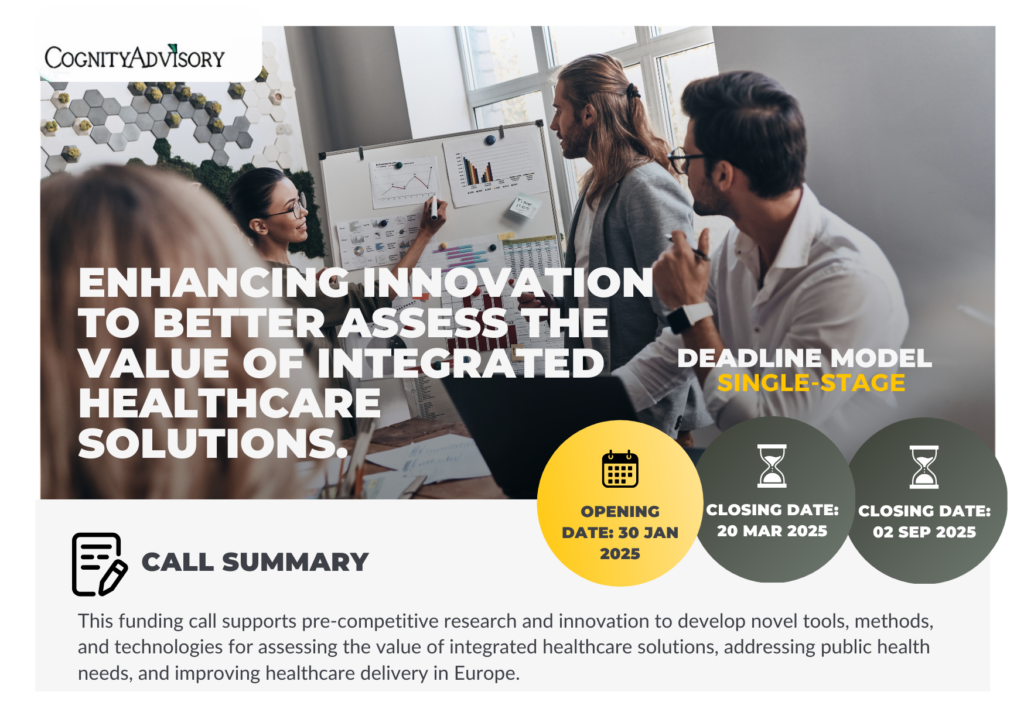HORIZON-JU-IHI-2025-09-05-single-stage
General information
Programme
Horizon Europe (HORIZON)
Call
Innovative Health Initiative JU Call 9 (HORIZON-JU-IHI-2025-09-single-stage)
Type of action
HORIZON-JU-RIA HORIZON JU Research and Innovation Actions
Type of MGA
HORIZON Action Grant Budget-Based [HORIZON-AG]
Open For Submission
Deadline model
single-stage
Opening date
16 January 2025
Deadline date
29 April 2025 17:00:00 Brussels timeTopic description
Expected Impact:
The actions to be funded under this topic are expected to achieve the following:
a. contribute to one or more of IHI JU’s expected impacts linked to IHI JU’s Specific Objective 5, as reflected in the IHI JU SRIA, i.e.:
- seamless and successful implementation in healthcare settings of cross-sectoral innovations, integrated products and services delivering proven benefits to patients, healthcare systems and society as a whole;
- patients have improved access to innovations that meet their needs and those of the healthcare systems;
- better informed decision-making at different levels of the healthcare system (authorities, organisations), that will in turn contribute to a better allocation of resources towards cost-effective innovations;
- faster entry to the market of cost-effective innovative solutions developed by industry, which could translate to a positive effect on their R&I investments.
b. contribute to strengthening the competitiveness of the EU’s health industry, via increased economic activity in the development of health technologies, in particular, integrated health solutions, and thus fostering European technological leadership and the digital transformation of our societies.
The actions are expected to contribute to EU programmes, initiatives and policies such as the European Green Deal, Europe’s Beating Cancer Plan, the EU Mission on Cancer, the European Virtual Twins Initiatives, the European Health Emergency Preparedness and Response Authority (HERA), the European Commission’s proposal for the European Health Data Space (EHDS), and the EU Artificial Intelligence Act1, where relevant.
1 EU Artificial Intelligence Act | Up-to-date developments and analyses of the EU AI ActExpected Outcome:
Applicants must define the outcomes expected to be achieved by the project ensuring that they contribute to at least one of IHI JU’s potential outputs linked to the IHI JU’s specific objective 5 ‘enable the development of new and improved methodologies and models for a comprehensive assessment of the added value of innovative and integrated healthcare solutions’ as reflected in the IHI JU Strategic Research and Innovation Agenda (SRIA).
Actions (projects) to be funded under this topic must deliver results that address public health needs and support the development of future health innovations that are safe, people-centred, effective, cost-effective and affordable for patients and for health care systems.
The expected outcomes may cover the entire spectrum of care and may be health technologies centred around disease areas and/or key themes such as prevention, precision diagnostics, personalised medicine, and chronic disease management. They may also include solutions for key enablers such as digital data and solutions, artificial intelligence (AI), regulatory science, greener and more sustainable healthcare, and implementation science1.
1 In the context of IHI, ‘implementation science’ refers to the development and piloting of methods and strategies that facilitate the uptake of evidence-based practice and research outcomes into regular use (e.g. translation of results, uptake, scale-up, piloting in healthcare).Scope:
With a view to harnessing new science and technologies, this topic aims to fund pre-competitive research and innovation for novel tools, methods, technologies etc. that will foster the development of health innovations to prevent, intercept, diagnose, treat, and manage diseases and enable recovery more efficiently.
Accordingly, applicants must assemble a collaborative public-private partnership consortium reflecting the integrative and cross-sectoral nature of IHI JU that is capable of addressing challenge(s) and scope of the IHI JU’s Specific Objective 5 ‘enable the development of new and improved methodologies and models for a comprehensive assessment of the added value of innovative and integrated healthcare solutions’; as defined in IHI JU’s legal basis1 and described in more detail in the IHI JU SRIA2.
Applicants should consider the following points in their proposals:
a. address an unmet public health need based on at least one of the below:
- the high burden of the disease for patients and/or society due to its severity and/or the number of people affected by it;
- the high economic impact of the disease for patients and society;
- the transformational nature of the potential results on innovation processes where projects are not focussed on individual disease areas (e.g. health data analytics).
b. demonstrate the ability to translate research into innovative solutions that can be integrated/implemented into the healthcare ecosystem (taking into consideration the fragmented nature of European healthcare systems) and/or into industrial processes.
When applicable, proposals should consider relevant aspects of patient-centricity, with the help of the most suitable health technologies and/or social innovations, including open science and taking demographic trends into account as relevant.
If applicable, applicants are expected to consider the potential regulatory impact of the anticipated project’s outputs, and as relevant, develop a regulatory strategy and interaction plan for generating appropriate evidence and for engaging with regulators and other bodies in a timely manner, e.g. EU national competent authorities, notified bodies for medical devices and in vitro diagnostic devices, health technology assessment (HTA) agencies, and the European Medicines Agency (EMA) through existing opportunities for regulatory support services such as the Innovation Task Force and qualification advice.
As relevant, consideration should also be given to the Health Data Access Bodies that will be established under the forthcoming European Health Data Space Regulation3 in the context of secondary use of data.
Applicants should consider relevant existing initiatives/projects to ensure synergies and complementarities and avoid unnecessary overlap and duplication of efforts. The proposal should include a plan on how they propose to synergise with these initiatives.
